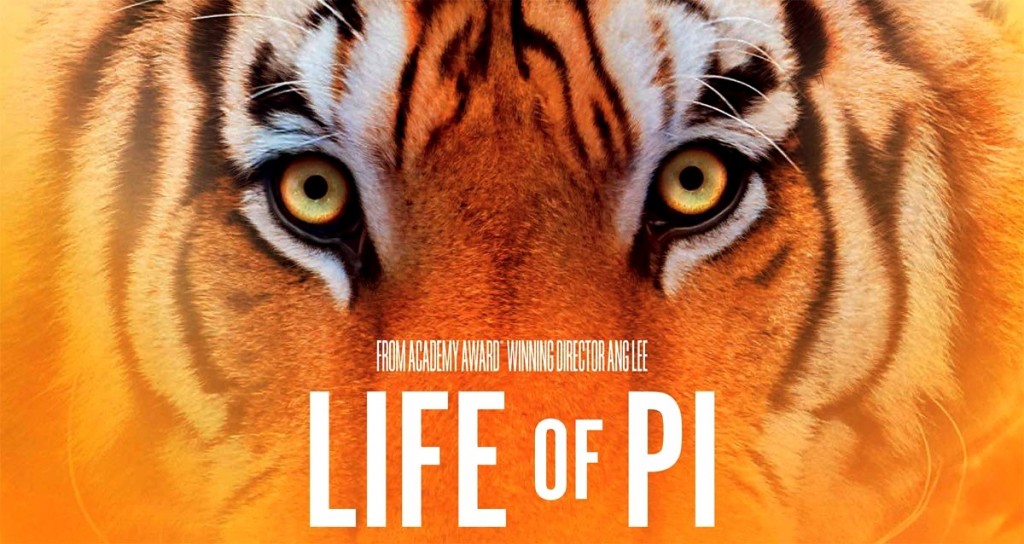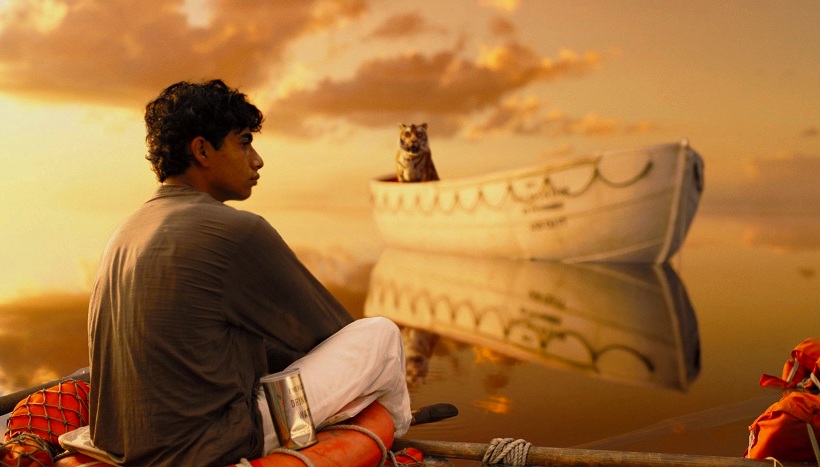
“You don’t know the strength of your faith until it has been tested.” – Pi
Magnificently cinematic, comparisons are far between. Life of Pi has the absorbing power of a great novel to assimilate with its visual gifts. And you have the feeling that it’s going to possibly compare to a pedigree adaptation like “The Namesake” or something. But it leads to a parable about life, pushing the importance of withstanding loss and unceremonious departures – extracting a message, God’s plan, fate – and coming out the other end with elevated wisdom. The adventure is a shipwreck at sea, which feels like an episode but is drawn out into the film’s bulk. Ang Lee is the director, and this is his fourth masterpiece following “The Ice Storm” (1997), “Crouching Tiger Hidden Dragon” (2000) and “Brokeback Mountain” (2005).
Days like these make me realize that many movie characters don’t possess shreds of true wisdom. I was enthralled by Pi’s storytelling, the Indian actor Irrfan Khan (“Slumdog Millionaire”) playing the adult version of the character. Suraj Sharma wonderfully plays the young version, and we see him go from inquisitive teenager to adult.
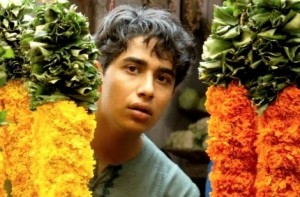 We get early scenes of Pi, teased at school for his full-name Piscine (sounds: pissing) until he shortens it. He has a first love which is fated for heartbreak and an unnourished goodbye which only hungers him to go back. His family must let go of the zoo they operate, transport the menagerie of animals to sell, and ride by ship to Winnipeg, Canada where their father will open a new business. The sea storm is horrific, disastrous and vivid – it makes a thriller like George Clooney’s “The Perfect Storm” into dated irrelevance.
We get early scenes of Pi, teased at school for his full-name Piscine (sounds: pissing) until he shortens it. He has a first love which is fated for heartbreak and an unnourished goodbye which only hungers him to go back. His family must let go of the zoo they operate, transport the menagerie of animals to sell, and ride by ship to Winnipeg, Canada where their father will open a new business. The sea storm is horrific, disastrous and vivid – it makes a thriller like George Clooney’s “The Perfect Storm” into dated irrelevance.
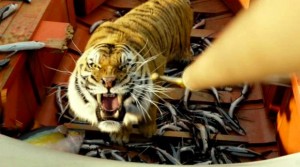 The living crew and passengers have perished, but Pi and four animals survive the wreckage on a lifeboat on the Mariana Trenches. The animals include a hyena, a zebra, an orangutan and a Bengal tiger which he christens the name Richard Parker. How these animals have ended up on the lifeboat is indeed plausible enough. Once convinced as a viewer this could happen, it becomes a fascinating situation of preserving and befriending the animals. Since that kind of simpatico friendship is impossible, Pi must tame the animals and work with them since the lifeboat can only occupy so much life, and so much temperance at once before it capsizes.
The living crew and passengers have perished, but Pi and four animals survive the wreckage on a lifeboat on the Mariana Trenches. The animals include a hyena, a zebra, an orangutan and a Bengal tiger which he christens the name Richard Parker. How these animals have ended up on the lifeboat is indeed plausible enough. Once convinced as a viewer this could happen, it becomes a fascinating situation of preserving and befriending the animals. Since that kind of simpatico friendship is impossible, Pi must tame the animals and work with them since the lifeboat can only occupy so much life, and so much temperance at once before it capsizes.
I never wanted the film to depart from the lifeboat, because I was too curious to see Pi master the lifeboat, and master the animals. Living at sea, parched and starving, with the need to fish and to negotiate perils, requires diligence and ability to suspend time in your mind. Because hours can get long, you must occupy yourself with something beyond just “hope.” A ship passes at one point, and Pi discharges the flare gun with “hope” he is seen, but he is able to cope with the disappointment when he is not seen.
He spends more days adrift, and in many cases many would die from dehydration and exhaustion, but he doesn’t because he is able to master the taming of Richard Parker. The power over an entity, a being, or an animal like Richard Parker gives us muster to exceed past our limits, doesn’t it?
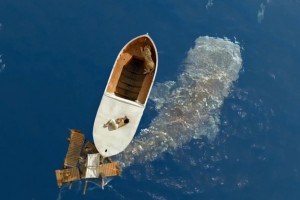 Many other reviews will talk about the storybook aspects, the arrangement of narration, the island of illusion, the technical accompaniment of 3D and how it integrates fully tactile marine life (which unlike most time, the usage adds tone and feeling to the story). But I will do something I guarantee nobody else has, by saying that the allegory is similar to that of “Woman in the Dunes” (1964) which I fearlessly proclaim as the best Japanese film ever made. In that film, an explorer is lowered to the bottom of a sandpit with the intent of a one night stay, and is told in the morning that he must now live there – to serve as companion to the woman of the dwelling. It is not an ideal living situation, he detests it, but like Pi, he learns to make the most of his spare surroundings. He masters the struggle, finds deliverance and life meaning beyond.
Many other reviews will talk about the storybook aspects, the arrangement of narration, the island of illusion, the technical accompaniment of 3D and how it integrates fully tactile marine life (which unlike most time, the usage adds tone and feeling to the story). But I will do something I guarantee nobody else has, by saying that the allegory is similar to that of “Woman in the Dunes” (1964) which I fearlessly proclaim as the best Japanese film ever made. In that film, an explorer is lowered to the bottom of a sandpit with the intent of a one night stay, and is told in the morning that he must now live there – to serve as companion to the woman of the dwelling. It is not an ideal living situation, he detests it, but like Pi, he learns to make the most of his spare surroundings. He masters the struggle, finds deliverance and life meaning beyond.
125 Minutes. Rated PG.
DRAMA / INSPIRATIONAL / MASTERPIECE VIEWING FOR ANYTIME OF YEAR
Film Cousins: “Woman in the Dunes” (1964, Japan); “Walkabout” (1971); “Cast Away” (2000); “Aliens of the Deep” (2005).
